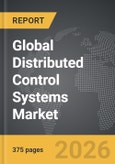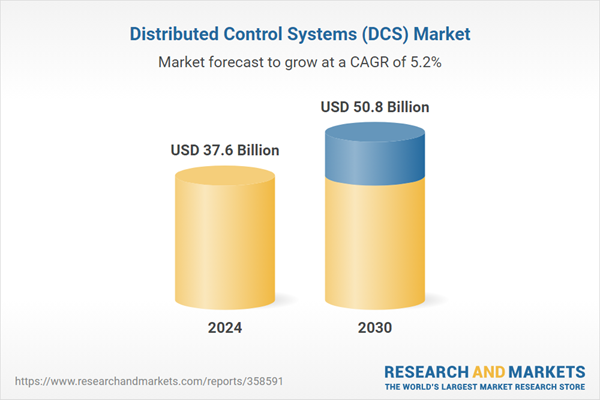Global Distributed Control Systems (DCS) Market - Key Trends & Drivers Summarized
What Are Distributed Control Systems and Their Role in Industrial Automation?
Distributed Control Systems (DCS) are sophisticated networks of control units that manage complex industrial operations across large plants or facilities. Central to modern manufacturing and processing industries, DCS ensures reliable, efficient, and flexible control over production processes. These systems are primarily used in industries where continuous processes are essential, such as oil refineries, chemical plants, power generation, water treatment facilities, and pharmaceutical production. By distributing control elements throughout the plant, DCS enhances responsiveness and minimizes risks of system failures, ensuring operations continue smoothly even under critical conditions. This arrangement not only improves safety and efficiency but also provides operators with detailed, real-time insights into production variables, leading to better decision-making and operational management.How Is Technological Evolution Shaping DCS?
The evolution of technology significantly impacts the development and capabilities of DCS. With advancements in IoT (Internet of Things) and AI (Artificial Intelligence), DCS systems are becoming more intelligent and autonomous. Integration of these technologies enables predictive maintenance, where the system can anticipate failures before they occur by analyzing data trends and operational anomalies. Moreover, the rise of Industry 4.0 has introduced greater connectivity and information exchange across manufacturing systems and processes. This has led to more sophisticated DCS platforms that offer improved data visualization, enhanced security features, and greater interoperability with other automation systems, thereby optimizing operational workflows and reducing downtime.What Are the Current Trends Impacting the DCS Industry?
Several trends are currently reshaping the DCS industry, influencing how systems are designed and implemented. There is an increasing demand for energy efficiency and reduced environmental impact in industrial operations, prompting DCS systems to incorporate more sustainable practices and controls. Additionally, as industries push towards digital transformation, there is a growing need for systems that support integration with cloud computing and big data analytics. This shift enhances the capability of DCS to perform more complex analyses and control functions, leading to smarter, data-driven decision-making processes. Another significant trend is the heightened focus on cybersecurity. As DCS systems become more connected, the potential for cyber threats increases, thus driving the integration of more robust cybersecurity measures to protect critical industrial infrastructure.What Drives the Growth of the DCS Market?
The growth in the DCS market is driven by several factors, including the increasing complexity of industrial operations and the need for improved safety and efficiency in process management. Technological advancements that enable integration with the latest IT solutions - such as IoT, AI, and cloud computing - substantially enhance the functionality of DCS systems, making them more appealing to industries looking to upgrade or build new facilities. The push towards digital transformation in manufacturing and processing industries also fuels the demand for DCS, as companies seek more efficient and scalable solutions to manage their operations. Additionally, regulatory pressures and environmental concerns compel industries to adopt systems that can help achieve compliance and reduce ecological footprints effectively. Consumer behavior trends towards sustainability and increased scrutiny of industrial practices influence companies to invest in advanced DCS solutions, ensuring ongoing market growth and innovation in control systems technology.Report Scope
The report analyzes the Distributed Control Systems (DCS) market, presented in terms of market value (USD). The analysis covers the key segments and geographic regions outlined below.- Segments: Component (Software, Hardware, Services); Application (Continuous Process, Batch-Oriented Process); End-Use (Oil & Gas, Power Generation, Chemicals, Food & Beverages, Pharmaceutical, Other End-Uses).
- Geographic Regions/Countries: World; United States; Canada; Japan; China; Europe (France; Germany; Italy; United Kingdom; Spain; Russia; and Rest of Europe); Asia-Pacific (Australia; India; South Korea; and Rest of Asia-Pacific); Latin America (Argentina; Brazil; Mexico; and Rest of Latin America); Middle East (Iran; Israel; Saudi Arabia; United Arab Emirates; and Rest of Middle East); and Africa.
Key Insights:
- Market Growth: Understand the significant growth trajectory of the DCS Software segment, which is expected to reach US$23.8 Billion by 2030 with a CAGR of 5.6%. The DCS Hardware segment is also set to grow at 4.9% CAGR over the analysis period.
- Regional Analysis: Gain insights into the U.S. market, valued at $10 Billion in 2024, and China, forecasted to grow at an impressive 8.7% CAGR to reach $11.1 Billion by 2030. Discover growth trends in other key regions, including Japan, Canada, Germany, and the Asia-Pacific.
Why You Should Buy This Report:
- Detailed Market Analysis: Access a thorough analysis of the Global Distributed Control Systems (DCS) Market, covering all major geographic regions and market segments.
- Competitive Insights: Get an overview of the competitive landscape, including the market presence of major players across different geographies.
- Future Trends and Drivers: Understand the key trends and drivers shaping the future of the Global Distributed Control Systems (DCS) Market.
- Actionable Insights: Benefit from actionable insights that can help you identify new revenue opportunities and make strategic business decisions.
Key Questions Answered:
- How is the Global Distributed Control Systems (DCS) Market expected to evolve by 2030?
- What are the main drivers and restraints affecting the market?
- Which market segments will grow the most over the forecast period?
- How will market shares for different regions and segments change by 2030?
- Who are the leading players in the market, and what are their prospects?
Report Features:
- Comprehensive Market Data: Independent analysis of annual sales and market forecasts in US$ Million from 2024 to 2030.
- In-Depth Regional Analysis: Detailed insights into key markets, including the U.S., China, Japan, Canada, Europe, Asia-Pacific, Latin America, Middle East, and Africa.
- Company Profiles: Coverage of players such as ABB Ltd., Azbil Corporation, Emerson Electric Company, General Electric Company, Honeywell International, Inc. and more.
- Complimentary Updates: Receive free report updates for one year to keep you informed of the latest market developments.
Some of the 36 companies featured in this Distributed Control Systems (DCS) market report include:
- ABB Ltd.
- Azbil Corporation
- Emerson Electric Company
- General Electric Company
- Honeywell International, Inc.
- Metso Corporation
- Mitsubishi Electric Europe BV
- NovaTech, LLC
- Rockwell Automation, Inc.
- Schneider Electric SA
- Siemens AG
- Toshiba International Corporation Pty., Ltd.
- Yokogawa Electric Corporation
This edition integrates the latest global trade and economic shifts into comprehensive market analysis. Key updates include:
- Tariff and Trade Impact: Insights into global tariff negotiations across 180+ countries, with analysis of supply chain turbulence, sourcing disruptions, and geographic realignment. Special focus on 2025 as a pivotal year for trade tensions, including updated perspectives on the Trump-era tariffs.
- Adjusted Forecasts and Analytics: Revised global and regional market forecasts through 2030, incorporating tariff effects, economic uncertainty, and structural changes in globalization. Includes historical analysis from 2015 to 2023.
- Strategic Market Dynamics: Evaluation of revised market prospects, regional outlooks, and key economic indicators such as population and urbanization trends.
- Innovation & Technology Trends: Latest developments in product and process innovation, emerging technologies, and key industry drivers shaping the competitive landscape.
- Competitive Intelligence: Updated global market share estimates for 2025, competitive positioning of major players (Strong/Active/Niche/Trivial), and refined focus on leading global brands and core players.
- Expert Insight & Commentary: Strategic analysis from economists, trade experts, and domain specialists to contextualize market shifts and identify emerging opportunities.
Table of Contents
Companies Mentioned (Partial List)
A selection of companies mentioned in this report includes, but is not limited to:
- ABB Ltd.
- Azbil Corporation
- Emerson Electric Company
- General Electric Company
- Honeywell International, Inc.
- Metso Corporation
- Mitsubishi Electric Europe BV
- NovaTech, LLC
- Rockwell Automation, Inc.
- Schneider Electric SA
- Siemens AG
- Toshiba International Corporation Pty., Ltd.
- Yokogawa Electric Corporation
Table Information
| Report Attribute | Details |
|---|---|
| No. of Pages | 375 |
| Published | January 2026 |
| Forecast Period | 2024 - 2030 |
| Estimated Market Value ( USD | $ 37.6 Billion |
| Forecasted Market Value ( USD | $ 50.8 Billion |
| Compound Annual Growth Rate | 5.2% |
| Regions Covered | Global |









